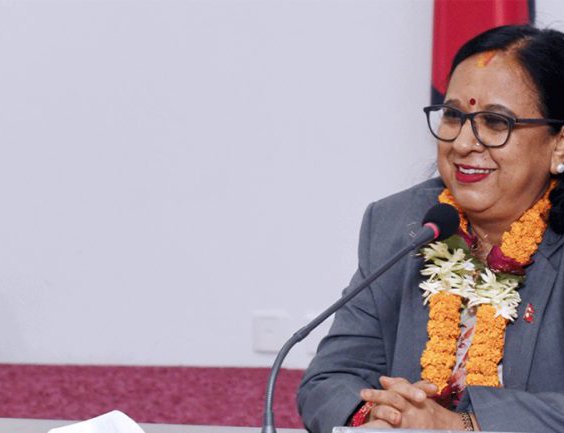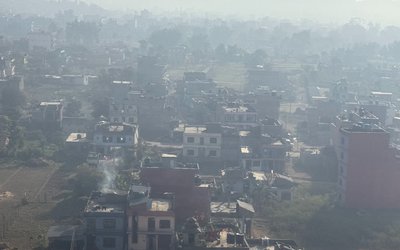
Nepal has made a historic appointment by designating Lila Devi Gadtaula as the country’s first female Chief Secretary of Nepal Government. This milestone, however, is marked by an unusually brief tenure. Gadtaula assumed the role of Acting Chief Secretary on 15 July 2024, and officially took on the position of Chief Secretary on 01 August 2024. Due to her impending retirement on 31 August 2024, based on the age limit stipulated by the Civil Service Act of 1993, her total time in office will amount to just 46 days;i.e15 days as Acting Chief Secretary and her 31 days as Chief Secretary.
The Civil Service Act provides for a term of three years for the Chief Secretary, while other senior roles, such as Secretary, are designated for five years. Gadtaula's tenure is markedly shorter compared to her male predecessors. Shanker Das Bairagi, for example, served for almost four years from 2020 to 2024, while LokDarshanRegmi held the position for nearly three years from 2017 to 2020. Even the shortest tenure among male Chief Secretaries, held by Mukunda Sharma Paudel, lasted two months from June to August 2006, which is still longer than Gadtaula’s combined term. How do we interpret this?
This disparity highlights the broader issue of gender imbalance in Nepal's top administrative roles. While Gadtaula’s appointment represents a significant step towards gender inclusion, her exceptionally brief tenure underscores the persistent challenges faced by women in maintaining high-level positions within the government. Addressing these issues will require comprehensive policy reforms, capacity-building initiatives, and cultural shifts to foster a more equitable environment for women in governance.
While Lila Devi Gadtaula's appointment as Nepal’s first female Chief Secretary is a historic achievement, her term of just 46 days (the duration of her in the position of the acting Chief Secretary and Chief secretary position combined) is shorter than even the briefest tenure of her male counterparts-serves as a reminder of the systemic barriers that still need to be addressed to achieve true gender equality in Nepal's administrative leadership.
Women representation in politics has surged with the legal and constitutional provisions but as we go up the ladder the representation goes low. Even now among in the office of the prime minister there are three people at the secretary position all of whom are males and eight people appointed at the joint secretary among which Shiwa Devi Dahalof Result Management Divisionis the only female. As per the list of ministers in the official website of the office of the Prime Ministers, among 22 ministers only 2 ministers are women:ArzuRana, Ministry of Foreign Affairs,and BidhyaBhattarai, Ministry of Education, Science and Technology.
With the surge in the demographics in number of women in politics after the legal and constitutional provisions mandating 33% women. Despitethis, why is it that there are only 2 women ministers out of 22 ministers in the cabinet?Lila Devi Gadtaula has been active in this sector since a very long time. What is it that brought about a sudden realization that she could be the Chief Secretary only one and a half monthsbefore the mandated retirement age?
SushilaKarki, the former Chief Justice of the Supreme Court of Nepaland the first and only woman till date to have held the post, became the Chief Justice on 11 July 2016 and ended her term on 09 June 2017. The Constitutional Council headed by the Prime Minister K.P.Oli recommended her for the post. This is a matter of pride for the nation. Butthe question is:after her tenure, there have been 5 people who have held the position of Chief Justice consecutively, but all of them have been males.Are we reverting to the same trend of getting men into decision making roles after making history with our first female leaders in the sector?
The challenges of women in politics are not simply related to barriers in entry into the game. It extends beyond this. From sustaining to excelling in the roles women navigate through socio-cultural, economic and institutional and policy barriers that stems from the deep rooted patriarchal system.Women have played significant roles in political leadership whenever given a chance. However, they have always been seen as subordinates rather than leaders. While the appointment ofGadtula is a huge step it is also a stark reminder that we still have a long way to go.
(Kharel is the host and producer of Inspiring Women and Global Perspectives talk shows.)
- Strengthening the Engagement of Men and Boys in the Fight for Gender Equality
- May 18, 2025
- When Skies Turn Gray: Kathmandu’s Struggle for Breathable Air
- Apr 16, 2025
- Nepal's Minister for Foreign Affairs highlights LGBTQIA+ achievements at a global forum
- Jan 06, 2025
- Micro-aggressions in Daily Life: Subliminal Discrimination against LGBTQI++ Communities
- Nov 16, 2024
- Navigating the Climate Crisis: Harnessing Indigenous solutions for a sustainable future
- Aug 04, 2024















